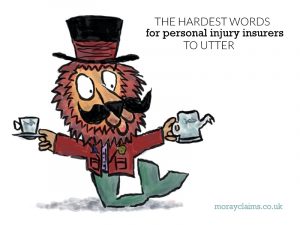If you like words and plays on words, the internet is a mine of nuggets. For example, in India, “Sari” always seems to be the hardest word. If you’re looking for “alternative” definitions of words, the Uxbridge English Dictionary (from BBC Radio 4’s I’m Sorry I Haven’t A Clue) has examples such as: Words are not always what they seem. The “plain meaning” of a word is rarely a given. The meaning of words can be twisted or ignored. In this article, we’ll consider 3 words / phrases which insurers in personal injury claim situations will avoid using if they can and will twist as far as possible if they cannot be avoided. What are these "unforgivable" words / phrases? We’ll get to them in a moment. First, we need to understand the context in which the problematic terminology arises. Your personal injury solicitor wants to achieve for you the highest level of compensation reasonably possible, as soon as reasonably possible. There are various tactics your solicitor Continue Reading
Pre-Action Protocol For Personal Injury Cases Becomes Compulsory
Shops in Scotland began charging 5p for single-use plastic carrier bags on 14 October 2014. Under the previous free-of-charge system, Scots were using around 800 million new bags a year. Scottish Government figures for 2014/15 show that the new law resulted in an 80% drop in plastic bag issue - equivalent to around 650 million fewer bags. It is becoming second nature for shoppers to take a bag with them from home. As a result, the spin-off benefits are obvious - for the environment and the good causes receiving donations collected from the bag tax. Having to pay the penalty of a 5p charge, if you don't provide your own bag, has transformed plastic bags from a nice-to-have optional item into a "don't leave home without it" necessity. The fact that plastic bag provision by supermarkets has dropped by 80% since the bag tax came in suggests it is not an exaggeration to say that we now regard providing your own bag as compulsory. Personal injury claims in Scotland are also Continue Reading

